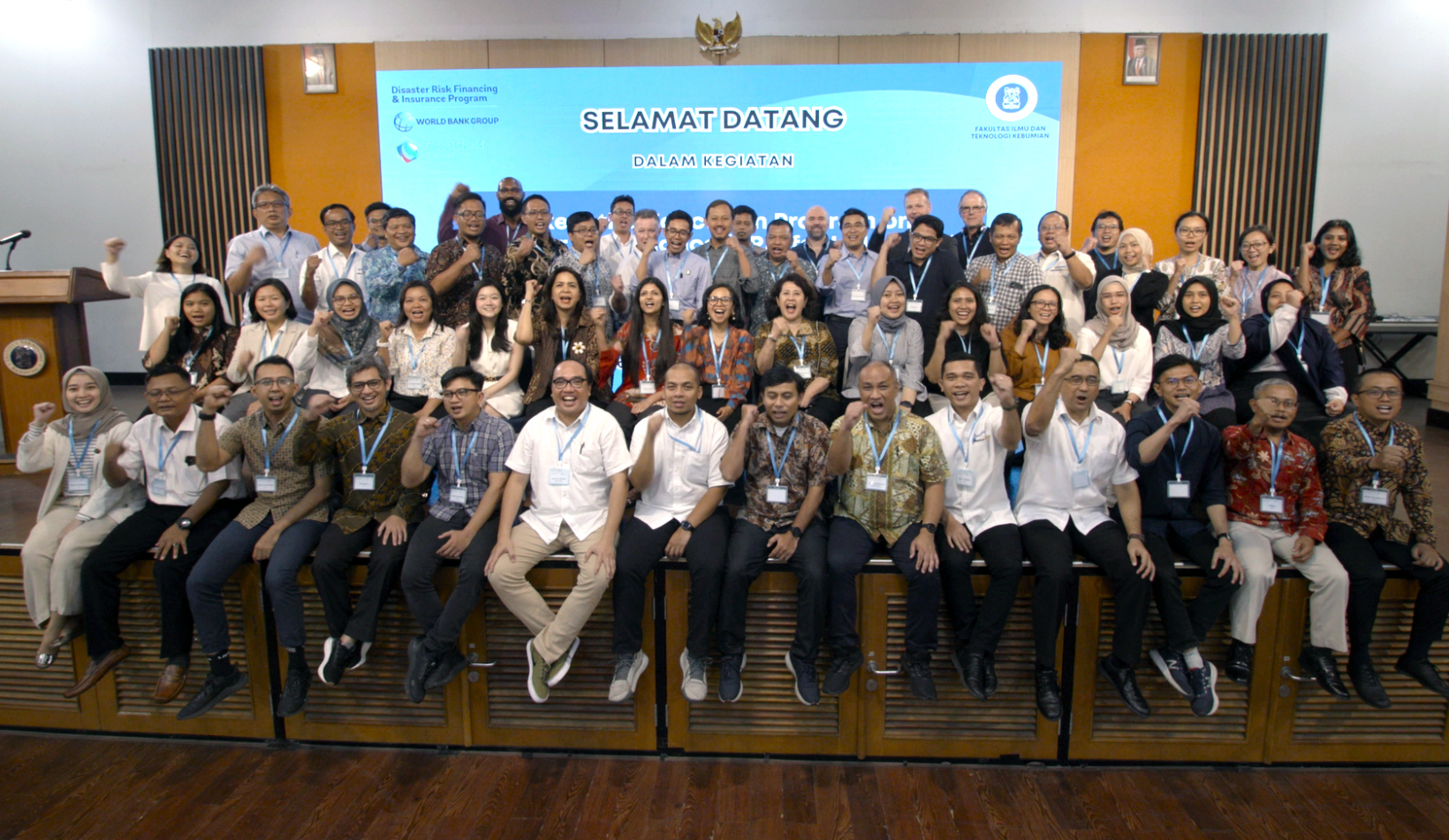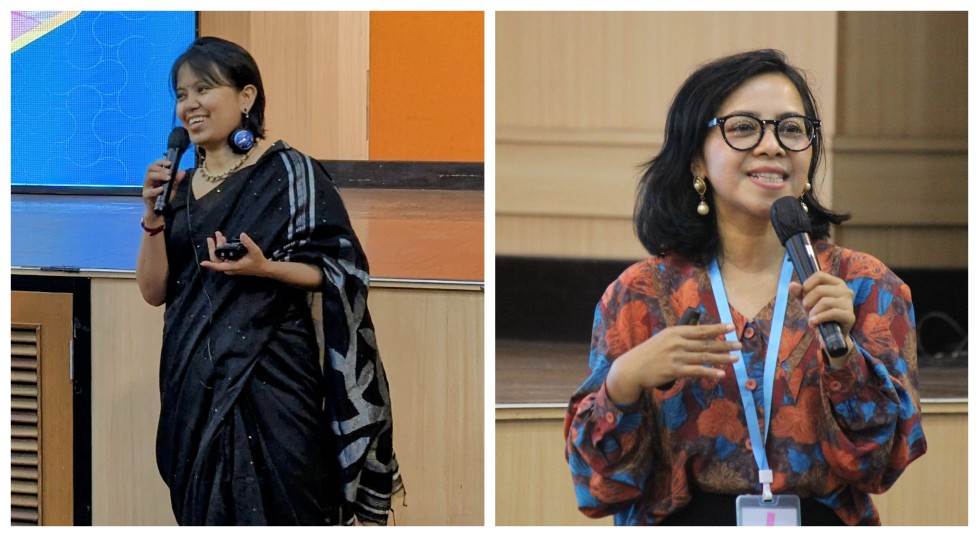“PRB, Indonesia, Tangguh”

“PRB, Indonesia, Tangguh!” This was the spirit of the week of March 4-7, 2024, when 37 government officials from five-line ministries and nine units within Ministry of Finance (MoF) convened at the Institut Teknologi Bandung (ITB). “PRB (Pembiayaan Risiko Bencana), Indonesia, Tangguh”, which translates to “disaster risk finance (DRF) for a resilient Indonesia” in Bahasa Indonesia, was the topic of discussion.
What is DRF? DRF is an approach for financial planning, where countries can prearrange finance in advance of climate shocks and disasters. This allows ready access to financing for response, recovery, and reconstruction activities when such events occur. Too often, financing for such events globally, is seen as “tomorrow’s” problem, and when tomorrow comes, governments are forced to reallocate funds from existing budgeted development programs or wait for humanitarian and development partners to come to their rescue. DRF is a way to think about tomorrow’s problems, “today”.
Indonesia, of course, is no stranger to disasters and no stranger to the importance of DRF. In 2018, with support from the Swiss State Secretariat (SECO) and technical assistance from the World Bank, the country launched its national DRF strategy – with the Minister of Finance, Ibu Sri Mulyani, championing this agenda.

In the strategy, the government outlines its key priorities, which center on the protection of state budget, protection of state assets, and protection of lives and livelihoods of the people of Indonesia. Since 2018, tremendous strides have been made in the implementation of these priorities. The government has established the Pooling Fund Bencana (PFB), which is envisioned to be the central state budget protection mechanism, and the state asset insurance program (ABMN), which is already offering insurance coverage to over 7,000 public buildings with over US$2bn in sum insured. Both these programs have been implemented with financial and technical support from the World Bank, coupled with support from the Global Shield Financing Facility (GSFF) and a program that finances technical support for members of the Southeast Asia Disaster Risk Insurance Facility (SEADRIF).
While the government has been on an upward trajectory in its journey of financial resilience, it has continued to request for more capacity building on the implementation of its DRF strategy. In response to this request, a few of us from the World Bank team went to Bandung in March 2023 to initiate a dialogue with ITB for designing the first-ever nationally curated DRF Executive Education Program. While the World Bank has developed effective global programs of this kind with leading universities such as Cambridge, the National University of Singapore, and Stellenbosch University, these are usually designed to address the general needs of countries, with a focus on the global exchange of DRF experiences.

It was at Noah’s Barn, a beautiful café in Bandung, that we started planning this targeted capacity building program for the Government of Indonesia. Why a local university? Two reasons: First, the goal from the outset was to ensure that the program developed would be sustainable and scalable within Indonesia. Second, we wanted each session to be designed in a manner that balanced Indonesia's experience on the DRF topic with relevant global examples. A partnership between ITB and World Bank meant leveraging ITB’s academic excellence and local understanding, with World Bank’s experience working on DRF in over 70 countries globally.
The ITB-World Bank DRF Education Program was developed through strong collaboration between the two institutions, with a pilot delivery to select government officials conducted in November 2023. The pilot was undertaken to test the content on government officials working on DRF, for whom the content was being designed. This approach was very effective and resulted in two key outcomes: i) adjustments of specific sessions based on the government’s needs and requests; and ii) inclusion of the more experienced MoF officials in the delivery of the program itself, to ensure the content can be customized to government needs to the greatest extent possible.
The final delivery, as a result, was a unique and exemplary example of capacity building targeted specifically to respond to a government’s priorities and needs on DRF, and facilitating enriching discussions and knowledge exchange amongst different ministries/units.

Here are a few key messages that emerged from the training held from March 4-7, 2024:
- #1: No one line ministry or unit can implement a DRF program alone. With the rich experience that emerged from the different units and line ministries that participated in the program, it is evident that the design and implementation of a DRF program, with championship from the Ministry of Finance, need to be socialized and owned by a broad set of stakeholders in the country.
- #2: It is important to ask the right questions of “what”, “why” and “how” at every step of implementation of a country’s DRF strategy. “What do I want to protect through my DRF program?”; “Is there enough technical basis to determine why I am doing this?”; “Do I have a clear understanding of how I will finance and implement this program?”; “Is the right regulatory framework in place to ensure effective implementation of this program?”
- #3: No one gets it right the first time. So, it’s important to trial-and-error, and adapt. There is no one size fits all, perfect DRF solution. It is important to start somewhere. But it is even more important to remain flexible and agile, so solutions can be adapted to evolving needs and contexts.
- #4: Capacity building and education programs are most effective when tailored to meet government priorities and needs. It is important to carefully curate and target knowledge and capacity development programs so they can be contextualized and address the questions governments are trying to address.
As we wrapped up the week in Bandung – or the “Paris of Java” as it is known by those who love this city – I was left with Albert Einstein’s quote – “the only source of knowledge, is experience” – which was the fundamental principle around which the DRF executive education program for Indonesia was designed. We hope that subsequent versions of the DRF executive education program that are delivered by ITB and other leading universities in Indonesia are enhanced and strengthened with experience from the country’s progress on DRF and from the experiences of others globally.
*This program received funding from the Global Shield Financing Facility (GSFF).